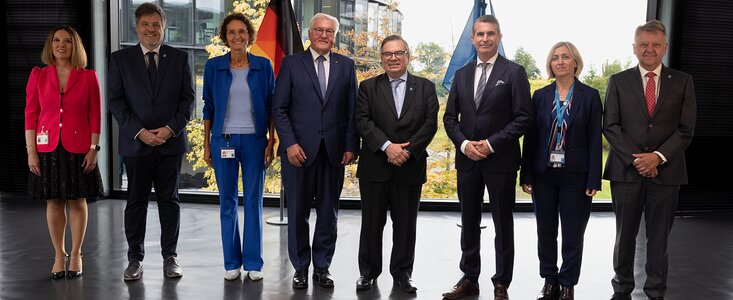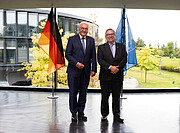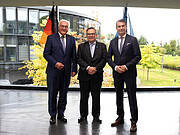Mitteilung
Bundespräsident Steinmeier besucht den ESO-Hauptsitz in Garching
2. September 2025
Der Bundespräsident der Bundesrepublik Deutschland, Frank-Walter Steinmeier, hat gemeinsam mit einer Delegation von Vertretern, darunter dem Bayerischen Staatsminister für Europaangelegenheiten und Internationales, Eric Beißwenger, den Hauptsitz der Europäischen Südsternwarte (ESO) in Garching bei München besucht. Während seines Besuchs informierte er sich über aktuelle Entwicklungen bei der ESO. Dies geschah im Anschluss an seinen Besuch der ESO-Standorte in Chile im März 2025. Außerdem besichtigte er die technischen Einrichtungen und die Bereiche für Öffentlichkeitsarbeit am deutschen Standort der ESO.
Der Bundespräsident, der Bayerische Staatsminister und die Delegation wurden vom Generaldirektor der ESO, Xavier Barcons, begrüßt und mit Mitgliedern der obersten Leitungsebene der ESO in Garching und in Chile bekannt gemacht. Zur Gruppe gehörten Claudia Burger, Direktorin der Verwaltung; Andreas Kaufer, Direktor der Beobachtungsbetriebe; Sara Krauss, Direktorin der Technik; und Adrian Russell, Direktor der Programme.
ESO-Generaldirektor Barcons sagte: „Es ist uns eine Ehre, Bundespräsident Steinmeier nach seinem Besuch unseres Paranal-Observatoriums in Chile Anfang dieses Jahres nun auch an unserem Hauptsitz in Garching willkommen zu heißen. Ich freue mich sehr über sein anhaltendes Interesse an der Wissenschaft und den Innovationen, die die ESO vorantreibt. Besonders schätze ich das Engagement und die kontinuierliche Unterstützung von Bundespräsident Steinmeier für den Schutz der Qualität des Standorts Paranal, der derzeit durch ein großes Industrieprojekt in seiner unmittelbaren Umgebung bedroht ist.“
Bundespräsident Steinmeier verdeutlichte die Relevanz der Arbeit der ESO und die Notwendigkeit, die Bedingungen für die Spitzenforschung der ESO sicherzustellen. “Das hängt natürlich daran, dass die ESO eine stabile Finanzierung braucht,” sagte er und betonte, wie wichtig es ist, den Standort Paranal zu schützen. “Das bedeutet, möglichst auszuschließen, dass es Vibrationen, dass es insbesondere Lichtverschmutzungen gibt, die jede Forschung beeinträchtigen werden,” sagt er. “Die deutsche Bundesregierung und ich selbst haben die chilenische Regierung gebeten, Sorge dafür zu tragen, dass diese Forschungssbedingungen weiter erhalten bleiben."
"Ich will mich hier ganz herzlich bedanken bei der Arbeit, die die ESO die Forscherinnen und Forscher für die ESO tun. Ganz herzlichen Dank dafür, dass Sie auf diesem Spitzenniveau forschen und Ergebnisse liefern. Ich will nicht nur danken, sondern ich möchte auch ermutigen, diese Arbeit fortzusetzen.”
Die Besucherinnen und Besucher wurden durch die Große Integrationshalle (Large Integration Hall) geführt – das größte technische Labor am ESO-Hauptsitz. Hier werden zahlreiche Komponenten für Teleskope und wissenschaftliche Instrumente entwickelt, montiert und getestet. Dazu gehören auch Instrumente und wissenschaftliche Geräte für das revolutionäre neue Projekt der ESO, das Extremely Large Telescope (ELT), das in unmittelbarer Nähe des Paranal-Observatoriums in Chile entsteht. Anschließend führte der Weg die Delegation ins ESO Supernova Planetarium & Besucherzentrum.
Deutschland ist seit den Anfängen der ESO in den 1960er-Jahren eng mit der Organisation verbunden – nicht nur als Gründungsmitglied, sondern auch als Gastgeber des Hauptsitzes und größter Beitragszahler zum ESO-Haushalt. Viele der bedeutendsten Entdeckungen der ESO waren unter Mitwirkung deutscher Forschender möglich, darunter auch die Ergebnisse, die 2020 mit dem Nobelpreis ausgezeichnet wurden. Deutsche Forschungsinstitute haben zudem die Entwicklung einiger wissenschaftlich leistungsfähigster ESO-Instrumente geleitet. Auch die deutsche Industrie hat maßgeblich zu zahlreichen ESO-Projekten beigetragen, darunter das Unternehmen SCHOTT, das die Spiegelrohlinge sowohl für das ELT als auch für das Very Large Telescope (VLT) gefertigt hat.
Kontaktinformationen
Bárbara Ferreira
ESO Media Manager
Garching bei München, Germany
Tel: +49 89 3200 6670
Email: press@eso.org
Über die Mitteilung
| ID: | annlang25002-de |
Our use of Cookies
We use cookies that are essential for accessing our websites and using our services. We also use cookies to analyse, measure and improve our websites’ performance, to enable content sharing via social media and to display media content hosted on third-party platforms.
ESO Cookies Policy
The European Organisation for Astronomical Research in the Southern Hemisphere (ESO) is the pre-eminent intergovernmental science and technology organisation in astronomy. It carries out an ambitious programme focused on the design, construction and operation of powerful ground-based observing facilities for astronomy.
This Cookies Policy is intended to provide clarity by outlining the cookies used on the ESO public websites, their functions, the options you have for controlling them, and the ways you can contact us for additional details.
What are cookies?
Cookies are small pieces of data stored on your device by websites you visit. They serve various purposes, such as remembering login credentials and preferences and enhance your browsing experience.
Categories of cookies we use
Essential cookies (always active): These cookies are strictly necessary for the proper functioning of our website. Without these cookies, the website cannot operate correctly, and certain services, such as logging in or accessing secure areas, may not be available; because they are essential for the website’s operation, they cannot be disabled.
Functional Cookies: These cookies enhance your browsing experience by enabling additional features and personalization, such as remembering your preferences and settings. While not strictly necessary for the website to function, they improve usability and convenience; these cookies are only placed if you provide your consent.
Analytics cookies: These cookies collect information about how visitors interact with our website, such as which pages are visited most often and how users navigate the site. This data helps us improve website performance, optimize content, and enhance the user experience; these cookies are only placed if you provide your consent. We use the following analytics cookies.
Matomo Cookies:
This website uses Matomo (formerly Piwik), an open source software which enables the statistical analysis of website visits. Matomo uses cookies (text files) which are saved on your computer and which allow us to analyze how you use our website. The website user information generated by the cookies will only be saved on the servers of our IT Department. We use this information to analyze www.eso.org visits and to prepare reports on website activities. These data will not be disclosed to third parties.
On behalf of ESO, Matomo will use this information for the purpose of evaluating your use of the website, compiling reports on website activity and providing other services relating to website activity and internet usage.
Matomo cookies settings:
Additional Third-party cookies on ESO websites: some of our pages display content from external providers, e.g. YouTube.
Such third-party services are outside of ESO control and may, at any time, change their terms of service, use of cookies, etc.
YouTube: Some videos on the ESO website are embedded from ESO’s official YouTube channel. We have enabled YouTube’s privacy-enhanced mode, meaning that no cookies are set unless the user actively clicks on the video to play it. Additionally, in this mode, YouTube does not store any personally identifiable cookie data for embedded video playbacks. For more details, please refer to YouTube’s embedding videos information page.
Cookies can also be classified based on the following elements.
Regarding the domain, there are:
- First-party cookies, set by the website you are currently visiting. They are stored by the same domain that you are browsing and are used to enhance your experience on that site;
- Third-party cookies, set by a domain other than the one you are currently visiting.
As for their duration, cookies can be:
- Browser-session cookies, which are deleted when the user closes the browser;
- Stored cookies, which stay on the user's device for a predetermined period of time.
How to manage cookies
Cookie settings: You can modify your cookie choices for the ESO webpages at any time by clicking on the link Cookie settings at the bottom of any page.
In your browser: If you wish to delete cookies or instruct your browser to delete or block cookies by default, please visit the help pages of your browser:
Please be aware that if you delete or decline cookies, certain functionalities of our website may be not be available and your browsing experience may be affected.
You can set most browsers to prevent any cookies being placed on your device, but you may then have to manually adjust some preferences every time you visit a site/page. And some services and functionalities may not work properly at all (e.g. profile logging-in, shop check out).
Updates to the ESO Cookies Policy
The ESO Cookies Policy may be subject to future updates, which will be made available on this page.
Additional information
For any queries related to cookies, please contact: pdprATesoDOTorg.
As ESO public webpages are managed by our Department of Communication, your questions will be dealt with the support of the said Department.




